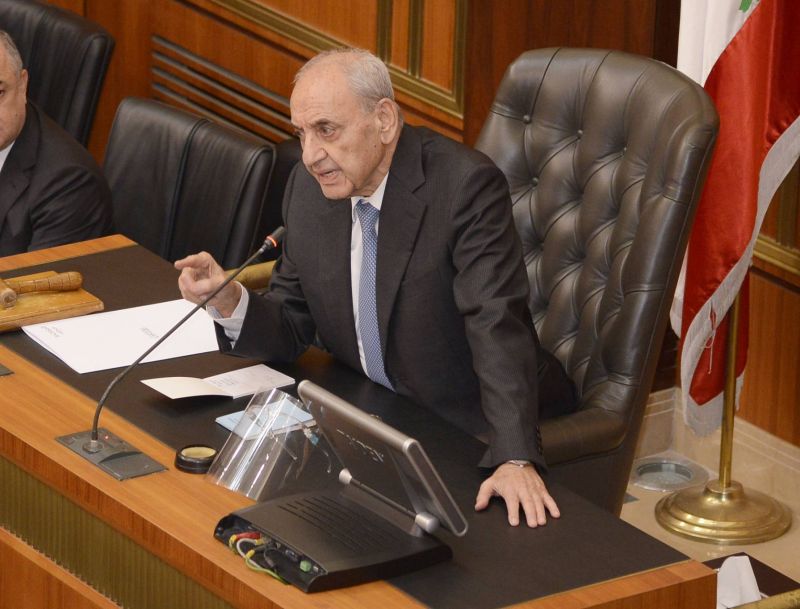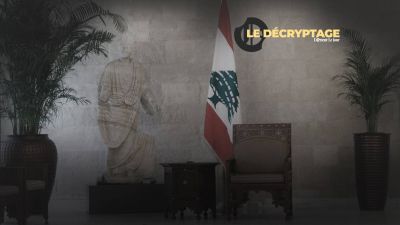
Parliament Speaker Nabih Berri during a presidential election session on Dec. 1st. (Credit: Ali Fawaz/Lebanese Parliament)
The eighth parliamentary session devoted to electing Lebanon's next president was adjourned Thursday, less than an hour after it began, without reaching a result.
As in previous weeks, Parliament Speaker Nabih Berri barely waited for the end of vote counting in the first round before adjourning the session and announcing — after several members had already left the chamber — a new meeting on Thursday, Dec. 8.
This ritual of a first round followed by the direct adjournment of the session, the quorum having been lost after the departure of Hezbollah, the Amal movement and Free Patriotic Movement MPs, has been going on since the first parliamentary electoral meeting on Sept. 29, despite a double executive power vacancy.
In the first round, a total of 111 MPs voted. Thirty-seven voted for Zgharta MP Michel Moawad (he received 42 votes during the previous session) and 52 cast blank ballots. Among the other candidates who received votes, professor and academic Issam Khalifeh got four votes (six votes during the last session) and former minister Ziyad Baroud two (also two votes during the last session). Meanwhile, nine MPs voted for "The New Lebanon," one "For Lebanon," one other for official presidential candidate Bechara Abi Younes and one for ex-customs chief Badri Daher (who is in detention for the probe on the Beirut port explosion). Four ballots were canceled, one of which bore the name of ex-Brazilian president Lula da Silva.
Sleiman Frangieh's name, which had been slipped into the ballot box two weeks ago, did not emerge this Thursday.
Moawad loses votes
Before the start of the vote, Berri said he was "ensuring the election of a president as soon as possible," in response to Lebanese Forces MP Antoine Habchi, who accused him of not wanting to facilitate the election.
"Do not accuse me of this," Berri added, while the MPs of his party continue to vote blank and withdraw from Parliament after the first round of voting.
Michel Moawad, MP for Zghorta and presidential candidate, said that "the constitution is trampled at every session with the loss of quorum. We cannot continue like this. Those who wait for regional and international agreements to elect a president are not aware of what the people are enduring. There is a divorce with the people," he blasted, in an exchange with the press after the end of the session.
"I lost two votes because of the decision of the Constitutional Council," which last week accepted last week two appeals for invalidating the elections of former MPs of Rami Finge and Firas Salloum to Parliament. "There are also three more votes lost today. We can't get enough votes to be in a strong position," Moawad conceded.
"I am sure that if we elect a president who is subject to [Hezbollah's] weapons and to the logic of sharing the cake or a president who rounds off the edges, we will go towards more collapse," Moawad said.
For his part, Deputy Parliament Speaker Elias Bou Saab said he voted for Ziyad Baroud to avoid voting blank, since "there is no horizon" for Michel Moawad, according to him. "All parties do not agree; the proof is that a candidate has lost votes today," he said, referring to Moawad. He then pleaded for an "agreement" on a candidate. Bou Saab also spoke against a proposed meeting of Najib Mikati's caretaker cabinet, an option that the caretaker Prime Minister has reportedly been considering.
"We have not seen an answer to the suffering of the people," Bilal Abdallah, an MP from Walid Jumblatt's Progressive Socialist Party, said after the session inside Parliament. "I am asking for a special session for the budget of the Health Ministry and hospitals. It is not because the presidential election sessions are being hindered that people's access to hospitals should be hindered too."
"Burn the name" of Frangieh
Tripoli MP Faisal Karami, back in Parliament after the Constitutional Council accepted his appeal last week against Rami Finge, pleaded for an "agreement."
Karami added that he refuses to "burn the name" of Marada leader Sleiman Frangieh, considered an unofficial candidate for the presidential election, saying that "the proposals of Michel Moawad are proposals of challenge." "
Until then, it is impossible to make Michel Moawad head of the state, hence the need for agreement," he said. "Without dialogue and agreement, we will remain in this vicious circle," Karami warned.
Najat Aoun, a Chouf MP with the Forces of Change bloc, said she voted "for Michel Moawad" in a statement after the session. "We cannot continue like this; it is painful to see sessions that lead to nothing. MPs must remain inside Parliament until they elect a president," she said.
Forces of change MP Mark Daou, for his part, criticized the fact that Haidar Nasser, a Tripoli MP who joined Parliament last week after winning an invalidation appeal against Forces of change MP Rami Finge, "left the session without even attending the counting," which contributed to the loss of the quorum.
"It is sad to see that the presidential election is still being obstructed while the institutions are in a deplorable state. We are sounding the alarm because the caretaker government has become the government of hell," Ibrahim Mneimneh, Forces of Change MP for Beirut, said.
MP Michel Doueihy, who left the Forces of Change parliamentary group in recent weeks, said he cast a blank ballot. He also indicated that he would consider boycotting the next sessions as the same scenario has been repeated each week.
"We spoke with the Lebanese Forces at the end of the session," independent Beirut MP Nabil Badr said. "We will also meet with Michel Moawad tomorrow, and then with the PSP. We will see if there is a possibility of electing a consensus president who is unanimous within the opposition."
More than two months of deadlock
The presidential election has remained unsuccessful for more than two months due to the lack of consensus between the different political blocs on a single candidate. Such a consensus is traditionally considered a prerequisite for the election of a new head of state in Lebanon and is currently regularly demanded by Hezbollah and its allies who, in the last sessions, voted blank.
The Lebanese Forces and the Progressive Socialist Party, as well as the Kataeb party and independent MPs, voted for their colleague from Zgharta, Michel Moawad. However, these parties are struggling to gather more votes around Moawad, whose candidacy is in any case rejected by Hezbollah and the FPM.
Hezbollah has made it clear that its preferred candidate is Sleiman Frangieh, leader of the Marada Movement, a rival of the Aounists who are not ready to give him their votes.
In the first round, the president must be elected with 86 votes (two-thirds), while an absolute majority of 65 votes is required in subsequent rounds. However, in previous sessions, Parliament did not reach a second round of voting, as members of the Hezbollah camp and its allies withdrew after the first round was counted, leading to the loss of the quorum each time.
At each new session, Berri considers that it is again a first round and that the number of votes required is 86. However, some MPs challenge this procedure as unconstitutional.
